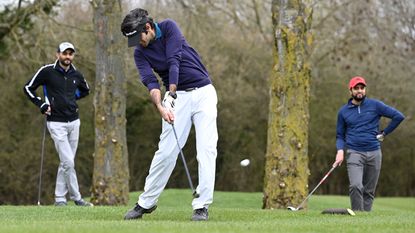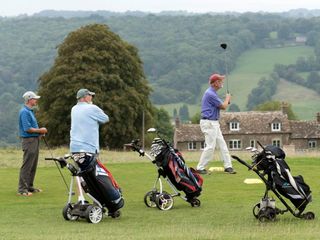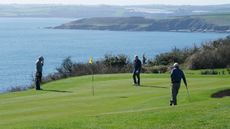Why Golf Is Great Through Every Decade
Fergus Bisset examines why golf remains great through the decades of life and what can be done to enhance the experience further.


Fergus Bisset examines why golf remains great through the decades of life and what can be done to enhance the experience further.
Why Golf Is Great Through Every Decade
Golf appeals to different people for many reasons, both sporting and social, but one of its greatest assets is the fact it can be enjoyed by people of all ages.
If you're starting in the game as a junior, you can look forward to over half a century of golfing pleasures ahead.
Here, we consider why golf is great through every decade of your adult life. Both on and off the course, the sport continues to deliver as life progresses.
20s
In most sports, this is the decade where players achieve peak performance, but not necessarily in golf, although 20-somethings do have certain physical advantages.
Footloose and fancy-free, they can enjoy golf without the burden of too many responsibilities.
Get the Golf Monthly Newsletter
Subscribe to the Golf Monthly newsletter to stay up to date with all the latest tour news, equipment news, reviews, head-to-heads and buyer’s guides from our team of experienced experts.
Playing benefits
Golfers in their 20s should have no problems with fitness and flexibility and should play without pain or fatigue. Younger muscles are faster, allowing the younger golfer to hit a more powerful ball.
Other physical positives include: greater fitness allowing more practice; greater flexibility allowing for a wider range of shots; better eyesight to see the ball and read undulations.
The young golfer has fewer demons.
They haven’t had time to become anxious or uncertain, to suffer a bout of the yips or even the “unmentionables”.
This allows them to play their golf with freedom and a clear head.

The wider picture
Fewer family commitments should mean more time available for getting out on the fairways.
There are, generally, reduced membership rates available to golfers in their 20s, making the game a little cheaper.
And, with fewer responsibilities, there’s a little more disposable income to throw at kit and trips away.
It’s a great way to socialise and catch-up with pals who have just embarked on their working lives.
How could it be better?
More club events for younger members. An 18-30s youth championship might appeal.
In the clubhouse, 23-year olds don’t want to attend the autumn ball or a Hank Marvin tribute. More cross-generational social events like a comedy night or sports quiz maybe.
30's
This is the prime of golfing life from a playing perspective. In the professional game, golfers in their 30s have enjoyed great success over the years.
But there are more than just playing benefits to enjoy as the young golfer matures.
Playing benefits
Physically, there shouldn’t be too many issues to contend with.
A player in his or her 30s should possess good flexibility and fitness and be able to hit a long ball.
Golfers in their 30s have grown to better understand the capabilities and limitations of their bodies and golf swings.
As a person matures, they accrue knowledge and experience that enables them to rationalise more effectively and respond with the appropriate course of action more consistently.
The 30-something golfer should make better decisions and fewer mistakes than his or her younger self.

The wider picture
With stress levels tending to rise through this decade (work, mortgage, kids), golf provides brilliant escapism.
It’s a chance to enjoy fresh air, a peaceful setting and some well-earned time off.
With friends often starting families in their 30s, it can be tougher to catch up. A round of golf or a golfing weekend away can allow that to happen.
In this decade of life, many people quit other sports because of injuries or lack of competitiveness. Golf fills a void.
For many people who loved football, rugby or other sports, golf allows them to keep on playing, stay competitive and keep on winning!
How could it be better?
More facilities to cater for young families.
Today, golfers in this age group want to feel that golf is a sport they can enjoy without abandoning the family at home.
40s
Life begins at... well, for many, golfing life does, or at least re-starts.
With work and home situations more established, thoughts turn to extra-curricular pursuits. For many reasons, golf is ideal for 40-somethings.
Playing benefits
Age tempers bravado. The desire to show off with huge drives and big shots has diminished. So then has the chance of blasting it off the planet.
Golfers in their 40s often seem to score more consistently, as they have learned to play within their games.
Perspective comes along! Golf seems pretty inconsequential compared with other things, so it’s easier just to enjoy it and, likely, play better as a result.

The wider picture
With a bit more surety in life and kids starting to grow up, getting away for a weekend game or even a trip away seems more viable.
As working life moves on and the heavy costs of starting adult life dissipate, more disposable money allows for a little more golf spend – perhaps a membership upgrade or just some new equipment.
Forty-somethings develop greater confidence in their own abilities and are in a position to make a difference in the game. They’re in a good place to understand what the older and younger players expect from a club and from golf generally.
How could it be better?
A return of more mid-am competitions for those aged 35 and over. These allow established amateurs to compete against contemporaries without having to battle the young guns. It’s still a long wait to senior golf after all!
50s
Passing the half-century mark, the opportunities to get the most from golf on and off the course escalate rather than dwindle.
There should be more time to play and there will be more events to participate in.
Playing benefits

Tom Watson almost won The Open at 59 and 50-year-old Phil Mickelson became the oldest Major winner in history at the 2021 PGA Championship, so it’s still possible to play golf at the highest level in your 50s.
Okay, the ball won’t go quite so far but, if they’ve looked after themselves, 50-somethings can still swing the club well.
Club technology has greatly helped golfers as they grow older.
Clubhead speed may have slowed, but with the right shafts, low-spinning balls and lightweight heads, they can still get it out there.
Growing older, competitive nature generally fades.
It’s not quite so much about the score on the card at the end, more just the pleasure of being out on the course. With that attitude, the score on the card is often pretty good.

The wider picture
With a little extra time and, hopefully, a little more cash, the 50-something can enjoy golf on their own terms: join the club they want to join; use the equipment they want to use; play when they want to play.
At either 50 or 55, golfers gain access to a new world – the seniors.
There are more competitions, societies and, above all, opens to play in.
Opens allow seniors to play away, even at prestigious venues, at dramatically reduced rates.
It’s a great way to exercise without the risk of injury. Walking five miles will strengthen muscles and bones, improve sleep and aid relaxation.
How could it be better?
Senior events and opens almost always take place on midweek days, precluding those at work from participating. More senior events on weekends could be a very popular option.
60s
The decade during which most people gain more free time that can be dedicated to hobbies and interests – why not golf?
Playing benefits
More time to play and more time to practise means many people actually start to play some of their best golf in their 60s.
Focusing on the short game can keep an older golfer competitive. A good short game can hugely reduce the gap between a player in their 60s and a young buck.
There are plenty of people at the club to play with and compete against. Not since junior days have there been so many golfers of a similar age looking for a game!

The wider picture
The 60-69 membership demographic is the largest at most UK clubs. This means clubs are generally set up to suit those in their 60s. Social events and the general atmosphere will appeal.
The 60-something can make the most of membership: playing the course; taking lessons; eating a leisurely lunch. Annual subs deliver real value for money.
More free time means planning golf at home or away is more feasible.
How could it be better?
As long as health and fitness remain, golfing in your 60s is tough to beat. However, perhaps early retirement might help further!
70s
And beyond...! Having reached the lofty heights of elder golfing statesman or woman, the older golfer can bask in the admiration of younger players who wonder at their continued ability to knock it round.
The club is a welcoming place and a home from home.
Playing benefits
There’s no point denying it, the golfer over 70 can’t hit the ball so far, but that can be a good thing.
A shot that would once have sailed clear over the OOB line may now stay just short. The chance to go for the green in two may have gone, but laying up to the correct spot can lead to more consistent scoring.

A poor shot for golfers in their 70s or above is never as bad as one for those in their 20s, 30s or 40s, at which point most are still labouring under the misapprehension that one day they will learn to play properly.
At 70 and beyond, most have fully accepted where their competencies and limitations lie.
Electric trollies and then buggies allow golfers to keep playing as long as they can keep swinging.
The wider picture
Golfers stay fit and healthy. Studies have shown that those who play golf live longer and it’s not hard to see why.
By continuing to walk around the course into their 70s and beyond, golfers will continue to better work their cardiovascular systems and keep their bodies strong.
As we grow older, we appreciate the chance to spend time with friends and golf is perfect for that. Enjoying an activity with like-minded contemporaries then a bite to eat and a glass of wine afterwards... what’s not to like?
Into retirement, it’s really important to have hobbies and interests and, ideally, one like golf that gets you in the fresh air, keeps you moving and provides that sociable element we all need.
How could it be better?
Many clubs don’t offer a five-day membership, and this could be appealing to older golfers who have time to play during the week and no longer fancy playing in the weekend competitions.

Fergus is Golf Monthly's resident expert on the history of the game and has written extensively on that subject. He is a golf obsessive and 1-handicapper. Growing up in the North East of Scotland, golf runs through his veins and his passion for the sport was bolstered during his time at St Andrews university studying history. He went on to earn a post graduate diploma from the London School of Journalism. Fergus has worked for Golf Monthly since 2004 and has written two books on the game; "Great Golf Debates" together with Jezz Ellwood of Golf Monthly and the history section of "The Ultimate Golf Book" together with Neil Tappin , also of Golf Monthly.
Fergus once shanked a ball from just over Granny Clark's Wynd on the 18th of the Old Course that struck the St Andrews Golf Club and rebounded into the Valley of Sin, from where he saved par. Who says there's no golfing god?
-
 'Gator Netting Is In Place' - Chevron Championship Venue Prepared For 'Safe' Winner's Jump
'Gator Netting Is In Place' - Chevron Championship Venue Prepared For 'Safe' Winner's JumpA tradition which began at the tournament's previous home could continue this year - if the champion is feeling brave enough...
By Jonny Leighfield Published
-
 New Balance 997 SL Golf Shoe Review
New Balance 997 SL Golf Shoe ReviewNew Balance produce some extremely stylish footwear and, in this review, Matt Cradock takes their spikeless 997 SL onto the course
By Matt Cradock Published
-
 Should Juniors Play In Adult Club Competitions?
Should Juniors Play In Adult Club Competitions?All golf clubs should be working hard to attract and retain junior golfers but is allowing them to play in adult competitions a good way to do it?
By Fergus Bisset Published
-
 Should Clubs Offer Free Membership For Juniors?
Should Clubs Offer Free Membership For Juniors?Fergus Bisset and Jeremy Ellwood take on each side of the argument.
By Fergus Bisset Published
-
 What Is The Golf Dress Code?
What Is The Golf Dress Code?The answer depends upon which club you visit, but there are some common themes as we explain...
By Roderick Easdale Published
-
 10 Things Clubs Can Do To Encourage More Junior Golfers
10 Things Clubs Can Do To Encourage More Junior GolfersJunior golfers are the game's next generation, so it's important that your club is welcoming them in the right way...
By Gary Munro Published
-
 How PGA Pros Are Nurturing The Next Generation Of Golfers
How PGA Pros Are Nurturing The Next Generation Of GolfersWe speak to two PGA pros to hear how they're getting the next generation engaged with the game...
By Robin Barwick Published
-
 Why Volunteers Are The Lifeblood Of Golf Clubs
Why Volunteers Are The Lifeblood Of Golf ClubsWithout volunteers, golf clubs would not be able to offer some of their much-loved sessions
By Robin Barwick Published
-
 How Volunteers Are Helping To Shape The Game Of Golf
How Volunteers Are Helping To Shape The Game Of GolfGolf's grass roots would not be the same without its volunteers...
By Robin Barwick Published
-
 Are Five-Day Golf Memberships A Good Idea?
Are Five-Day Golf Memberships A Good Idea?Do they offer flexibility or just a discount for the time-rich?
By Fergus Bisset Published